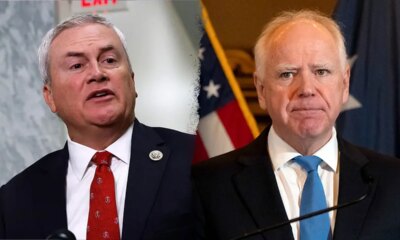Minneapolis, MN
Minneapolis Police Department faces stark officer shortage as it seeks to rebuild public trust

Minneapolis — On a recent Wednesday afternoon, Minneapolis Police Chief Brian O’Hara is racing to a priority call.
“I try to come out to show the officers I am here to back you up,” O’Hara tells CBS News.
O’Hara says his department is short by more than 200 officers, and has lost 40% of its police force in the last four years.
“It is incredible,” O’Hara said. “It’s not just that we lost 40% of the force, they’ve been facing the highest levels of crime and violence, in some categories, that the city has ever seen.”
Minneapolis is facing a surge in assaults, and nearly three dozen shooting calls a month. Officers have been subject to some mandatory overtime.
Large-scale police staffing shortages aren’t limited to Minneapolis. They are taking place in cities big and small, from coast to coast.
The Philadelphia Police Department is short about 1,170 officers, the agency told CBS News. The Chicago Police Department is short more than 1,140 officers, the department disclosed, while the Los Angeles Police Department is short more than 470 officers.
But in Minneapolis, the hurdle is more than just manpower, it is trust too. Nearly four years after the murder of George Floyd by a Minneapolis police officer, the department has cleaned the house of its top brass.
O’Hara was hired as chief in late 2022 from Newark, New Jersey — where he served as deputy mayor — as the department seeks to change its culture.
But not everyone thinks there’s been enough change yet.
“I don’t think that the department has been transformed by choice,” said Nekima Levy Armstrong, a Minneapolis community activist for nearly two decades. “I think that it’s been transformed by necessity.”
Armstrong says O’Hara has not yet rid the department of all officers who are too physical or too focused on people of color.
“It’s unfortunate that they’re down 40%, but this is of their own making, right? The handwriting was on the wall in regard to the conduct of many Minneapolis police officers,” Armstrong said.
Like many other departments, Minneapolis offers signing bonuses for new recruits. But O’Hara says the problem is deeper than money. In an February editorial in the Star Tribune, he posed the question: “Do we expect too much from police officers?”
“Well, people expect perfection every time, absolutely,” O’Hara told CBS News.
As he struggles to rebuild the force, O’Hara emphasizes to his officers that summer usually means a spike in crime.
“It’s getting warmer, and staffing is definitely a concern,” he told his staff at a recent roll call.

Minneapolis, MN
Minneapolis man arrested in Manchester after allegedly trying to meet minor for sex

MANCHESTER, Iowa — A Minnesota man has been arrested in Manchester after police say he attempted to meet someone he believed was a minor for sexual activity.
The Manchester Police Department said Robert Fenn Eselby III, 23, of Minneapolis was arrested Feb. 27 following an undercover investigation.
According to police, Eselby contacted an undercover officer posing as a juvenile through several social media platforms. Authorities said he was informed multiple times that the person he was communicating with was underage.
Investigators say Eselby sent explicit photos and videos and later arranged to travel to Manchester to meet the supposed minor for sexual activity.
Police said Eselby was taken into custody immediately after arriving in Manchester and was transported to the Delaware County Jail.
Authorities also said Eselby allegedly attempted to ask an arresting officer out on a date during the booking process.
Eselby faces one count of grooming, a Class D felony, and one count of disseminating obscene material to a minor, a serious misdemeanor.
Court records show he remains presumed innocent unless proven guilty in court.
Minneapolis, MN
What is a data center?

What exactly is a data center and why are so many being proposed across Minnesota? Professor Manjeet Rege, chair of Software Engineering and Data Science and director of the Center for Applied Artificial Intelligence at the University of St. Thomas, joins us to explain how these massive facilities store and process the world’s data and what the economic, environmental, and infrastructure questions are as Minnesota considers hosting more of them.
Minneapolis, MN
Minneapolis Ranked Among U.S. Cities With The Most People In Financial Distress

MINNEAPOLIS — Minneapolis is ranked among the American cities with the most people in financial distress nationwide, according to a recent analysis by WalletHub.
The personal finance website, which defines financial distress as having a credit account in forbearance or with deferred payments, looked at the country’s 100 largest cities without data limitations across nine metrics, including average credit score, change in bankruptcy filings year-over-year, and share of people with accounts in distress.
Minneapolis came in 44th on the list, between Stockton, California, at 43rd and Fresno, California, at 45th, according to the ranking.
Nationwide, the cities with the most people in financial distress were Chicago at No. 1, Houston at No. 2 and Las Vegas at No. 3, the ranking said.
“Getting out of the downward spiral of financial distress is no easy feat,” according to WalletHub analyst Chip Lupo.
“You may get temporary relief from your lenders by not having to make payments, but all the while interest will keep building up, making the debt even harder to pay off. People who find themselves in financial distress should budget carefully, cut non-essential expenses, and pursue strategies like debt consolidation or debt management to get their situation under control.”
Read more from WalletHub.
-

 World1 week ago
World1 week agoExclusive: DeepSeek withholds latest AI model from US chipmakers including Nvidia, sources say
-

 Massachusetts1 week ago
Massachusetts1 week agoMother and daughter injured in Taunton house explosion
-

 Wisconsin3 days ago
Wisconsin3 days agoSetting sail on iceboats across a frozen lake in Wisconsin
-

 Maryland4 days ago
Maryland4 days agoAM showers Sunday in Maryland
-

 Florida4 days ago
Florida4 days agoFlorida man rescued after being stuck in shoulder-deep mud for days
-

 Denver, CO1 week ago
Denver, CO1 week ago10 acres charred, 5 injured in Thornton grass fire, evacuation orders lifted
-

 Massachusetts2 days ago
Massachusetts2 days agoMassachusetts man awaits word from family in Iran after attacks
-

 Oregon6 days ago
Oregon6 days ago2026 OSAA Oregon Wrestling State Championship Results And Brackets – FloWrestling
























